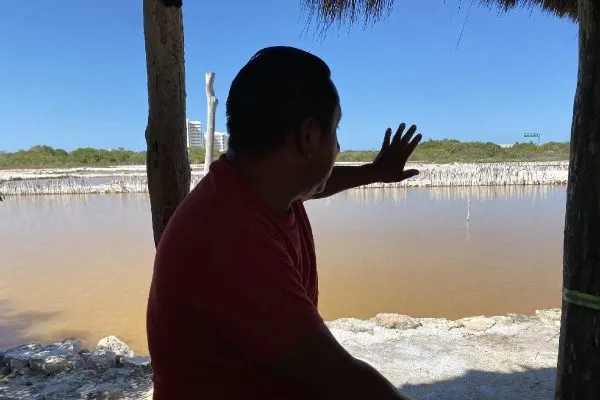José Chi Aké is one of the custodians of the 15 remaining active ponds at the pre-Hispanic saltworks of Xtampú, a traditional salt harvesting site in Dzemul, Yucatan. This unique location, known for its pink-hued waters in spring, is under threat from real estate and tourism development projects. Two decades ago, there were 113 ponds at this 400-year-old site. However, 98 of them (86%) have disappeared due to real estate expansion.
Today, 64 local families are seeking support from the state government to protect their heritage. A new threat has emerged as the local City Hall plans to install a potable water supply network, which could disrupt this ancestral practice. Concerns intensified when city hall staff began measuring for future pipelines near the ponds and a local mangrove area.
The proposed pipelines, intended to service new real estate developments, could potentially damage the nearby mangrove soil and flood the salt ponds in the event of a leak. A similar project was attempted previously but was cancelled by the Federal Attorney for Environmental Protection in November 2023 due to an alleged lack of an Environmental Impact Statement. Locals also accuse City Hall of failing to consult with citizens and prioritizing water supply to new beachfront residential areas over the needs of the village.
The local population is concerned about potential damage to the mangrove, which has already seen a decrease in vegetation from 98,756 to 96,873 hectares between 1981 and 2020, according to the Mangrove Monitoring System of Mexico.
Despite these concerns, José Wilberto Flota Aké, mayor of Dzemul, insists that he has consulted with the National Water Commission (Conagua) and the Potable Water and Sewerage Board of Yucatan. However, he admits that there is currently no official documentation to support this claim.
The coastal communities of San Bruno, San Benito, and Chabihau, located along a 16-kilometer stretch of coast, currently rely on private wells that are at risk of saltwater intrusion. The mayor argues that redirecting tax revenue to the municipality of Dzemul could resolve this issue.
Despite these challenges, the Salinera Xtampú Social Solidarity Society, comprised of around 70 men and women, including José, remains hopeful. They continue to harvest salt from the ponds using traditional methods, barefoot and with baskets.
Discover more from Riviera Maya News & Events
Subscribe to get the latest posts sent to your email.
